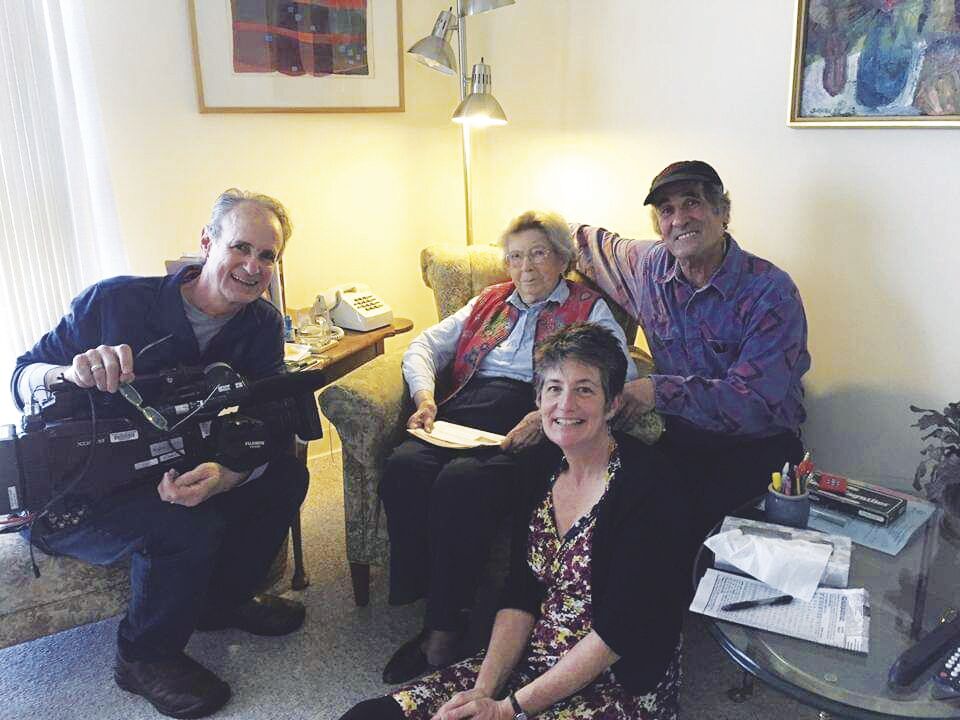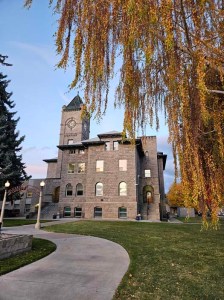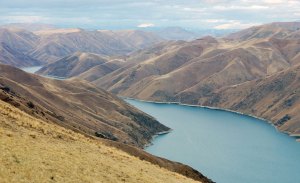Making it reel: Respected videographer Tom Shrider starts anew in Baker City
Published 12:00 pm Monday, August 7, 2023

- Tom Shrider, left, filming an interview with children's author Beverly Cleary, one of many artists and authors featured over the years in his work for Oregon Public Broadcasting's long-running program, "Oregon Art Beat."
All stories are built from captured sights and sounds, moments and meanings. And for videographer Tom Shrider, who moved to Baker City about a year ago after a nearly 40-year career with Oregon Public Broadcasting, the building of stories is his life’s work.
Trending
Shrider spent several decades producing videos for OPB that brought him tangible success. His office shelf doesn’t display more than one, but if it did, his six gleaming Emmy awards would take up quite a block of space.
Videography and editing work is the creation of a film’s flow and composition from a pool of footage and sound. And while some retirees would twist and groan at the notion of picking up their trade’s tools once again, for Shrider it’s a lifelong passion, and he intends to carry on with personal video projects in his new town.
“Editing is my truest love — I lose track of time when I start editing,” Shrider said. “I miss it, and I’m good at it, I think. And so I can do whatever films I want to do here.”
Trending
Shrider’s upbringing was a reflection of the 1950s archetypal nuclear family, his father’s work as an FBI agent supporting Shrider along with his mother and two sisters. His sisters actually preceded him in college to learn about television, but didn’t follow through with it as a career. Shrider says his parents supported his education throughout, and lived to see him succeed in the industry.
“I studied television in Eugene at University of Oregon, majored in that, and my first job out of college was at LAMS, which is the Legislative Assembly Meetings System in Salem, a little in-house system where they record,” he said. “And then I moved to Honolulu. When I started working it was in rooms worth $500,000 of editing equipment.”
Although video and editing are now digital, Shrider started his career during the analog era, roughly when VHS became mainstream over Betamax. Shrider says he doesn’t miss the old format, preferring the modern convenience of Adobe Premier Pro.
Shrider worked for NBC’s Honolulu affiliate doing nightly newscast work, but as Hawaii’s population rose he opted to return to Portland, where he was quickly scooped up by OPB in 1980.
He has spent much of the past 20 years behind the scenes of OPB’s “Oregon Art Beat” program, up until 2018. That’s also where he met his wife of 11 years, Suzette, who operates her own clay studio from one of their outbuildings in Baker City.
“Almost every artist we ever did a story on over the years, hundreds of them, said some version of the following statement: I decide what I want to make, I get started and then the piece says ‘No, let’s go this way,’ ” Shrider said. “That’s true of editing, too, that’s kind of the beauty of it, finding those connections.”
A Baker County connection
Though he’s lived most his life on the other side of the state, Shrider’s first Emmy award has a local origin. He was honored for an episode filmed in Halfway. That work was part of OPB’s “The Oregon Story,” series, which highlighted the lives of the locals one year after the town adopted the now defunct ‘Half.com’ name.
“We went to Halfway four times over different seasons, talked to people, got to know people there and produced an hour-long documentary about that, so we got our first Emmy,” Shrider said. “At OPB I wasn’t paid to be a producer, I was paid to edit, but at OPB if you reach up a bit they really are accommodating, so I do have some experience writing scripts and producing.”
Shrider said his professional influences include film directors Wes Anderson and Alfred Hitchock, and he says he’s drawn a lot of inspiration from 1967’s “The Graduate,” directed by Mike Nichols.
Among Shrider’s professional experiences, one of his more memorable and favorite projects was filming the last live interview with country/rock music pioneer Johnny Cash, in 2003. Some of the footage Shrider captured became part of the 2014 documentary “The Winding Stream: The Carters, the Cashes and the Course of Country Music.”
“That’s still running on Netflix, Amazon, or somewhere, so that was my favorite,” Shrider said. “He died about ten days after we did the interview, and he was very sick, but Johnny wanted to be part of it, he wanted to be on record.”
As for work of which Shrider is most proud, he cites a piece that he produced, filmed and edited, another Emmy winner called “Monster Man.”
“There was this clay guy who only did little monster figures, and was wildly popular,” Shrider said. “In the 80s he was making bowls and pots, but had this one little monster figure he’d made he considered it a good luck charm. People kept stopping by the booth, not interested in plates and bowls and asked ‘How much is that?’ ”
What he’s working on in Baker City
Shrider has begun a new YouTube account as “Tombozen,” focusing on the Baker area, posting a video most recently of the chalk art gathering in downtown Baker City. He’s putting together segments from Miners Jubilee and footage of the recent Shrine football game and parade.
He says that he wants to focus on the good character of the city that he can capture on film — the positives. Not only for art, but on occasion to fill community needs. Brian and Corrine Vegter, both artists as well as owners of Churchill School, introduced Shrider to the area, and after a few years of occasional visits he decided to move here after retiring from OPB.
Since relocating, Shrider’s been exercising his other talents, turning a rather plain yard into a lush, expansive garden, despite the damaging freeze in June. He says that for his years of gardening west of the Cascades, he’s never had success like this with the full sun available to him.
Still settling in, he’s considering offering classes out of Churchill, a chance to give those interested in film and editing some of his valuable insights and techniques.
Until then you may see him at many of Baker’s events camera in hand, making art for himself, and for the city making memories one frame at a time.
“Editing is my truest love — I lose track of time when I start editing. I miss it, and I’m good at it, I think. And so I can do whatever films I want to do here.”
— Tom Shrider, Emmy-winning videographer who recently retired in Baker City









